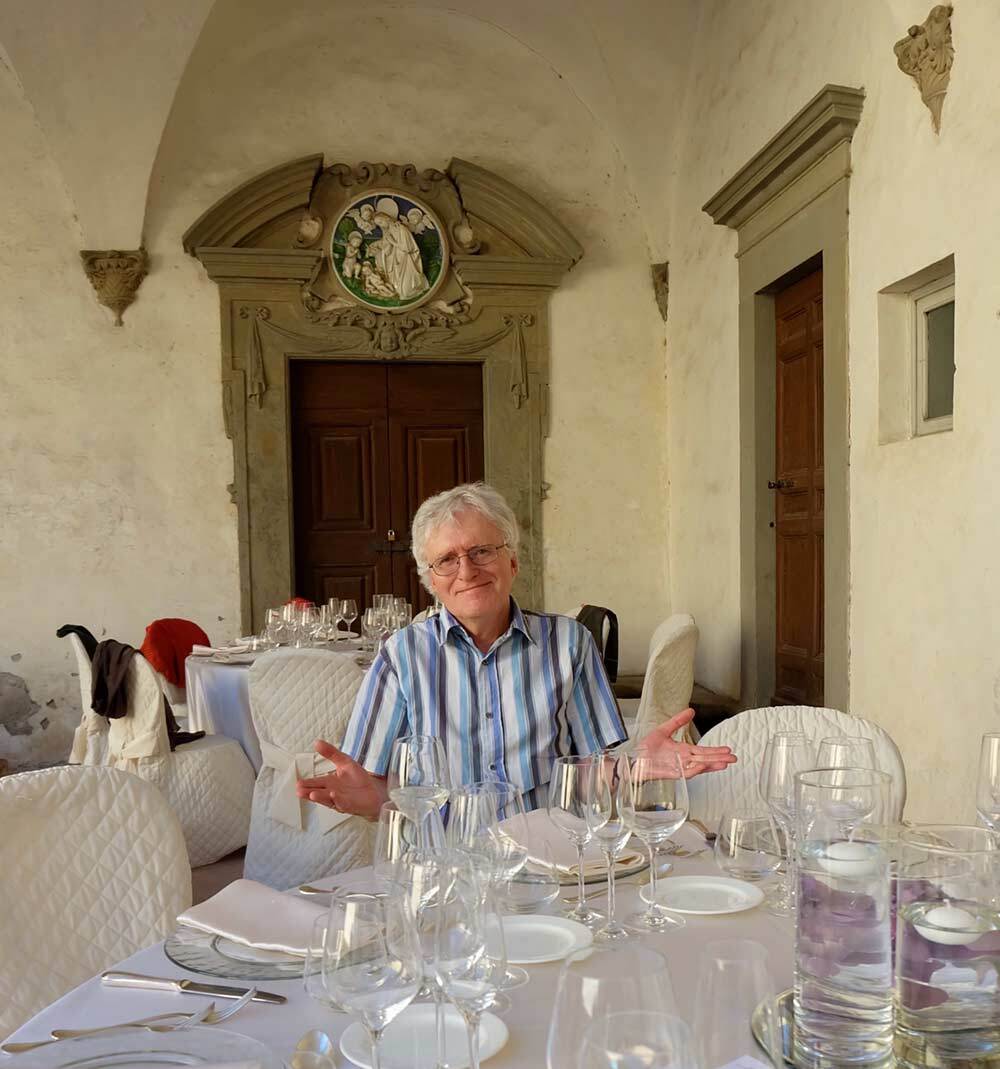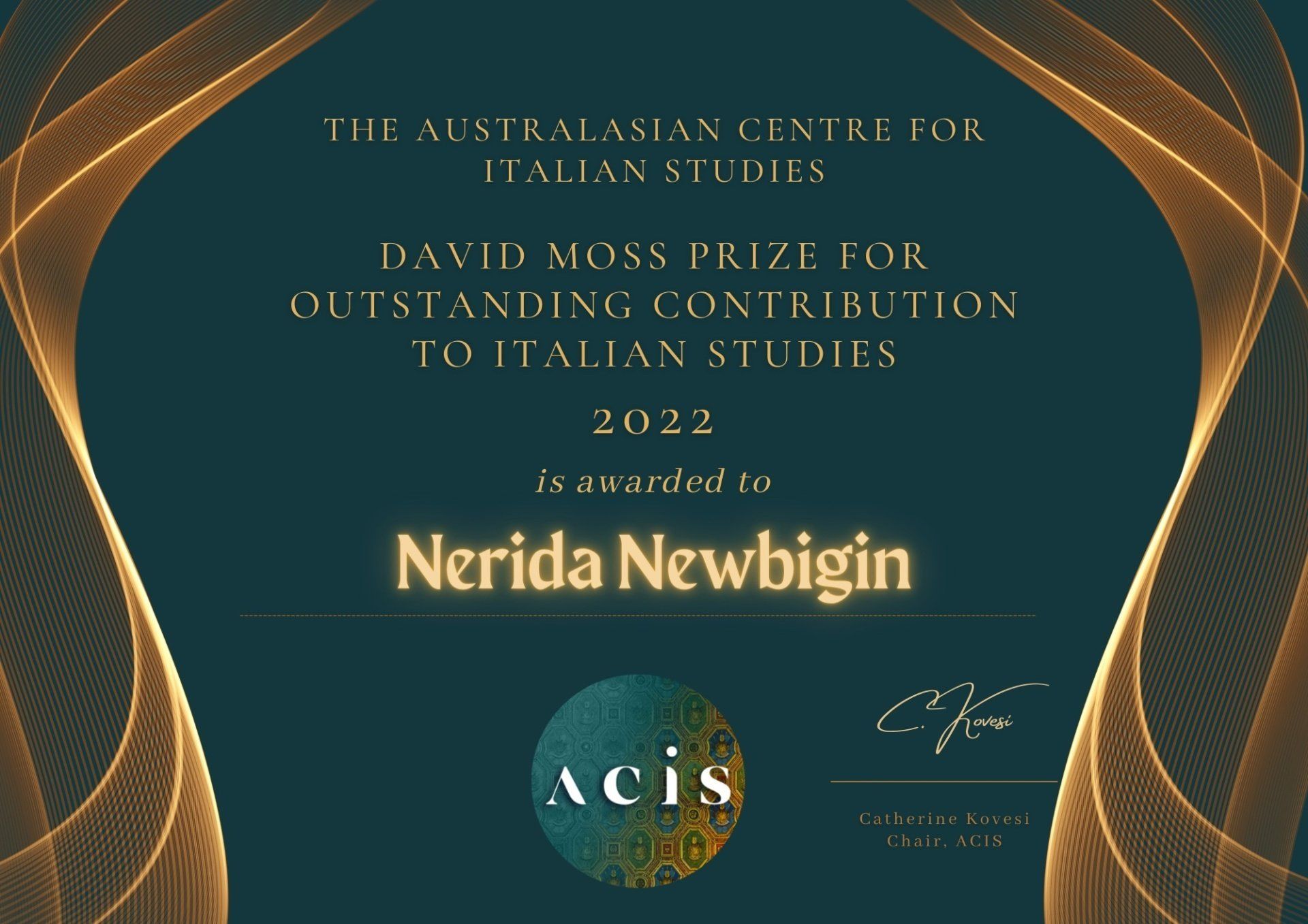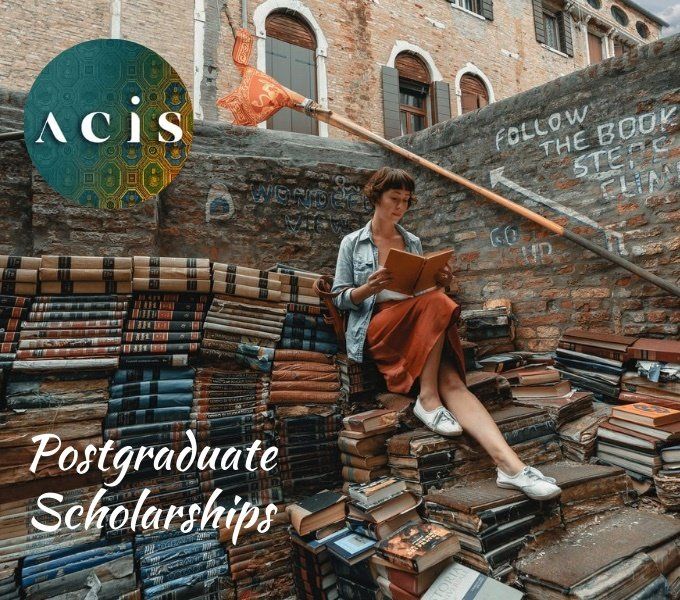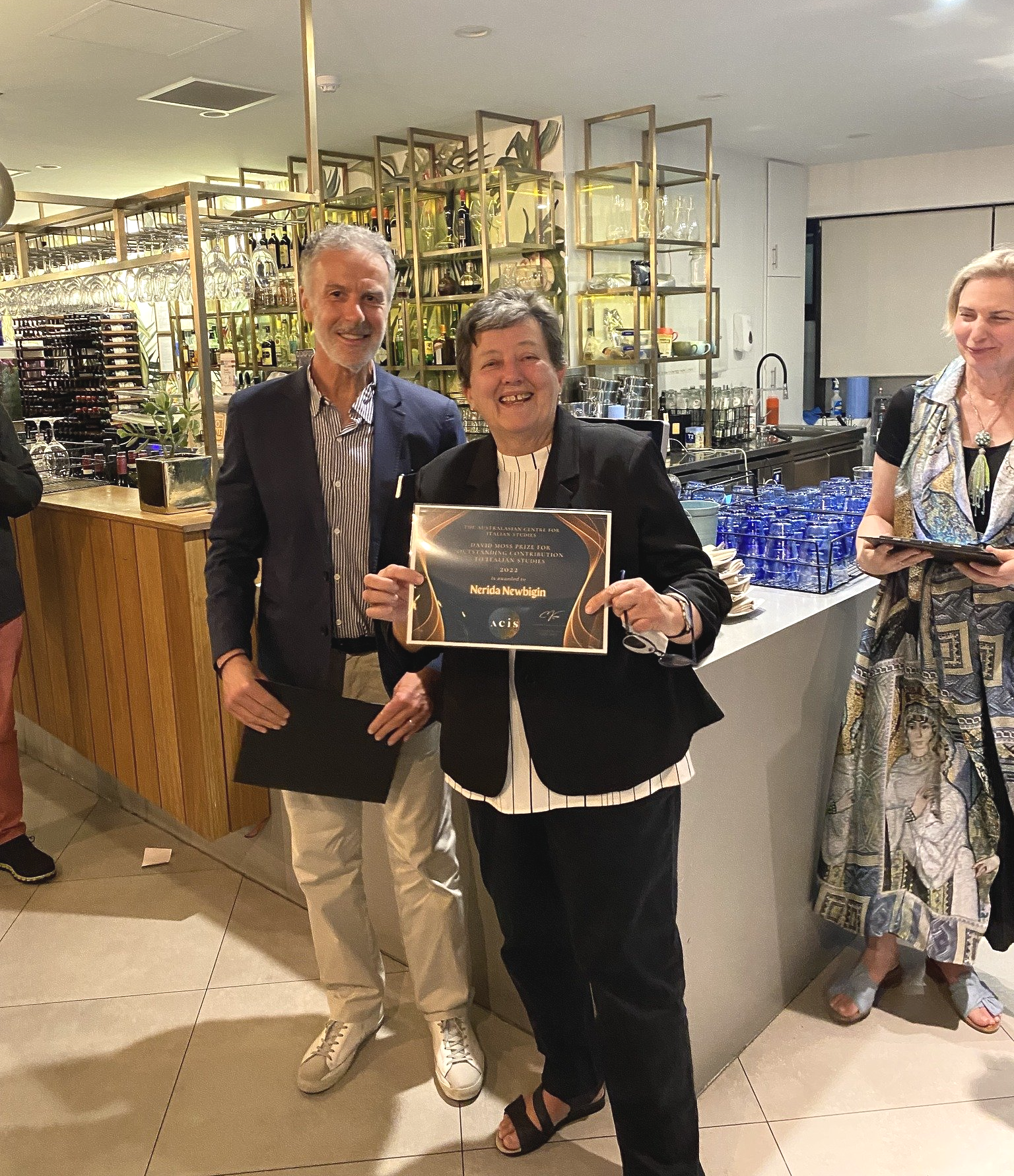Nerida Newbigin wins the David Moss Prize for Outstanding Contribution to Italian Studies
The ACIS Management Committee is delighted to announce that the inaugural David Moss Prize for Outstanding Contribution to Italian Studies in the region has been awarded to Emeritus Professor Nerida Newbigin. Professor Newbigin was presented with the prize by ACIS Patron, Santo Cilauro, at the recent 11th ACIS Conference in Perth, on 13 December 2022.
This prize is named to honour Professor David Moss, the founding Chair of the ACIS Management Committee, co-convenor of the first ACIS Conference held in Canberra at the ANU, and a tireless, enthusiastic and innovative champion of the cause of Italian Studies in Australasia. David was Professor of Italian and European Studies at Griffith University before achieving a rare distinction as a foreigner, the appointment as Professor of Cultural Anthropology at the University of Milan (the only foreign faculty member of a staff of 230).

Nerida Newbigin is Emeritus Professor of Italian Studies at the University of Sydney, and former Pro-Dean of the Faculty of Arts. She was elected to the Australian Academy of the Humanities in 1995, and appointed to a Personal Chair in Italian Studies at the University of Sydney in 2001. Nerida taught Italian Language and Literature at the University of Sydney from 1970 until her ‘retirement’ in December 2008, but she is still actively engaged as a researcher. Her research interests are philological and historical: the history of theatre and performance in the Middle Ages and the Renaissance, late medieval lay piety, and the editing and interpretation of theatrical texts and archival material. In June 2009, she set up a web page of transcriptions, texts, and translations prepared in conjunction with her teaching and research.
Nerida was selected by the Management Committee as the inaugural recipient of this prize in part due to her extraordinary and path-breaking career, with important contributions to the history of theatre and theatrical texts in the Middle Ages and Renaissance. In 2013 she published, together with Barbara Wisch, Acting on Faith: the Confraternity of the Gonfalone in Renaissance Rome (Philadelphia: Saint Joseph’s University Press), and the two-volume facsimile edition with critical commentary of the Codice Rustici (with Elena Gurrieri and Kathleen Olive) was published by Olschki in 2015. Most recent is her two-volume Making a Play for God: The Sacre Rappresentazioni of Renaissance Florence, published by the Toronto Centre for Renaissance and Reformation Studies (and winner of The Medieval and Renaissance Drama Society David Bevington Prize 2022). But Nerida was also selected because she has been extraordinarily supportive of Italian Studies in Australia and has been a strong advocate for Italian Studies nationally and internationally. She has been very active in the languages section of the Australian Academy of the Humanities and has generously mentored her students and younger scholars. She is one of the longest active female scholars in Italian Studies in our region and, as one of the Committee members wrote of her, she is: "a scholar of generosity as well as of quality who has given leadership in Italian Studies both through her advocacy as well as publications".
When informed of Nerida’s award of the prize named in his honour, David Moss wrote:
“From her first employment in 1970 until her retirement in 2008, Nerida has been a central figure in the philology and history of Renaissance theatre in Florence, Siena and Rome, exploring in magnificent detail the mystery of plays which involve representations of sacred stories and their personnel. Around this central theme Nerida has created work in editing, transcribing and translating key sources, often involving younger scholars whom she has taught. Her deep involvement in Italian Studies, during and beyond her work as an active teacher, has been a fundamental element in both language and literary studies, keeping Italian Studies a central part of this enterprise. If the Prize is designed to reward major contributions to the theme, there is no one better to receive the award than Nerida.”

In accepting her award at the ACIS Conference, Nerida spoke, in part, the following words:
“... This is an amazing and unexpected honour. I’m not speechless, but very nearly. ...
It is hard to feel that I deserve this award when I have spent my working life doing what other people do on their holidays: exploring Italy in her cultural and political and social complexity, and sharing the insights I have acquired along the way. It has been a joyous career, that became even richer in retirement. I recently weighed my post-retirement publications, monographs and volumes containing my essays (that might be cheating a bit) – and was astonished when they came in at 27 kg. A certain gravitas, one might say (although 16 kg was the Codice Rustici, which I edited with my former PhD student Kathleen Olive). The latter was presented to Pope Francis in 2015, as the gift of the Florentine Curia on the occasion of his first visit to Florence, but probably not for reading in bed.
In accepting this award, I want to acknowledge all my teachers and colleagues and students in Italian studies. One of the things that makes us all special and exceptional is our interdisciplinarity, our collaborations, and the support we have been able to give each other in our academic life. ACIS, together with its original sponsors, the Cassamarca Foundation and Dino De Poli, is right at the heart of these collaborations, as was put into words in the 2011 publication, Italy Under the Southern Cross, edited by Gino Moliterno and David Moss himself, and this support continues through the activities of ACIS, such as this conference, and the programme of scholarships, fellowships, and prizes.
I want to send my best wishes to those of you who are still toiling at the coalface. Italy, its language and its culture would survive perfectly well without you, but your roles as cultural mediators are what make your contribution so valuable. You enrich Australian culture by providing access to Italy, and you provide insights into Italian culture from an Australian perspective. In the multiple traditions of Humanism that you espouse, you make us more humane, better human beings. Many of you have faced huge challenges over the past three years, more than I ever faced in my charmed baby-boomer life. I take my hat off to you, and wish you every success in the future."
David Moss once wrote of himself: "I’m an anthropologist and the Italians have been my tribe". We are simply delighted that Nerida Newbigin should be the first member of the newly inaugurated David Moss Prize 'tribe'.









